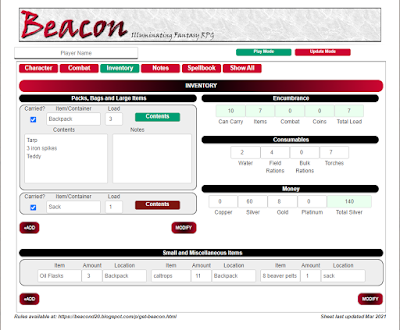I think I have the basics for an pretty simple morale system for Beacon. I like the idea of morale and especially the idea of having to coax hired NPCs or companion animals to do dangerous things. I'd really like to give more mechanical weight to charisma, and also more things or PCs to spend money on that have both narrative and game weight. I was toying with different ideas but think I've settled on the simplest. The base 'Morale' score for NPCs, henchmen, pets, etc. is 10 and can be modified plus/minus depending on game events and interactions. When there is a situation that would call for a morale check then the GM just sets a DC for it and the player most involved makes a d20 roll just like any other check. Send your war dog up against a bear might be a DC of 12, sending them to fight undead however might be a different story. The higher their bonus and the more loyal they are, the more likely to pass that morale check. And the other side as well.
SO pretty simple but what makes it work for me is the idea that this score is constantly tested and changes. Certain situations should automatically modify morale, just like sanity in a Cthulhu game, so say every time the NPC fails a morale check they get -1 to morale. If a party member dies the NPCs get -1 to morale from the shock. Maybe its -2 if its a PC who dies, their confidence falters. If they are mistreated or have to endure unpleasant treks or long boring waits, that's more -1s. On the other side if the PCs treat them well, or they have a decisive victory, or if the PCs give them a share of loot then their morale would go up. It would cap out at -10 (miserable) and +10 (fanatical) just to keep a lid on it, but the trend would be over time adventure situations should whittle away at morale and players will have to take remedial actions to woo back loyalty from long-term hirelings and henchmen.
Oh and I forgot, if an NPC misses 3 morale checks in a row they are done. They leave, or run away with the players map, or something fun. This is kind of like the 5th Edition death save except only on the failure end, one success will clear the tally but three strikes in a row and that NPC has had enough.
So now I need to make a table of morale changing events and put it into the rules in along with explanations for how it impacts hiring henchmen etc. I already have a good idea how this would work with character expenses and have made a table for the lifestyle expenses PCs can choose from while in town. Having PCs spend coin on keeping up a level of wealth will also sweeten the morale of their hirelings, the rich command more respect. When PCs return to civilization they can choose how long they stay and what level or wealth they maintain, and this will impact their relations with NPCs as well as determine healing, access to training etc. The morale modifier and Charisma bonus would be factored in to the starting morale of hirelings, everyone admires the rich man and wants to ride their coattails, but who wants to face danger for a slob in the gutter?
Living Expenses
When not exploring, characters will be in civilized or semi-civilized areas which will require daily expenses. The lifestyle a PC choses will have an impact on how fast they can recover from their adventures, and also how the local NPCs will react to them.
| Lifestyle | Cost/day | Description | Recovery | Social Modifier | Morale Modifier |
| Squalid | 1 sp | Sleeping in stables. | Gain HP = level | Disadvantage | -2 |
| Poor | 5 sp | Cheap food, Shared common rooms and common houses | Gain 1/2 Hit Dice | Disadvantage | -1 |
| Fair | 10 sp | Good food and drink, private accommodation. | Gain all HP and 1 STAT point | None | 0 |
| Good | 50 sp | Fine food and drink, clean private accommodation, access to facilities | Gain full HP, 1 STAT point, research and training allowed | Advantage | +1 |
| Aristocrat | 100 sp | Finest foods and drink, access to facilities, social opportunity, luxury accommodation | Gain full HP, 2 STAT, research and training. Audience with notables. | Advantage | +2 |
I see this as an optional rule and it can be used when its useful and waved when its not interesting. Maybe you only want to use it for hired hands and not for important NPCs like animal companions or apprentices. Maybe you want to do the opposite and only track morale for important NPCs. Or maybe use it for player characters who want to have reasons for interparty conflicts. I am going to put the morale tracker on the Beacon character sheets primarily for when making more detailed NPCs, however I see no reason it couldn't be used for PCs as well as NPCs. think it makes a good optional rule since some players might like to have a morale score as well to guide their roleplaying and others would just ignore it. You could even have some players use it and others not use it in the same game, from a PC side it would just inform play, so the perfect optional rule.





